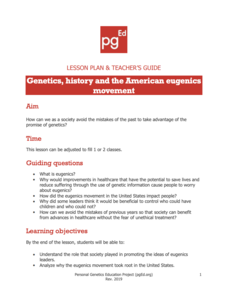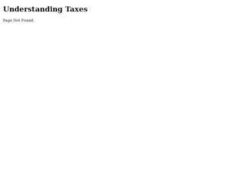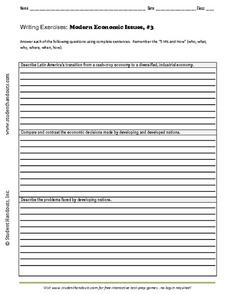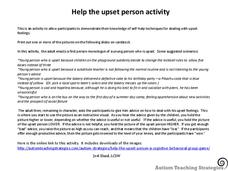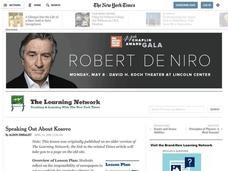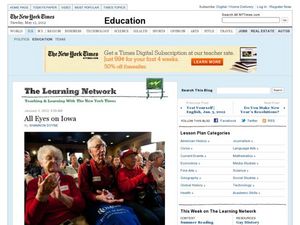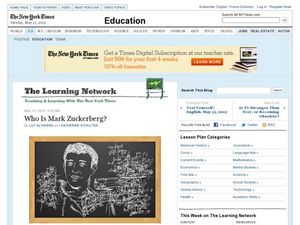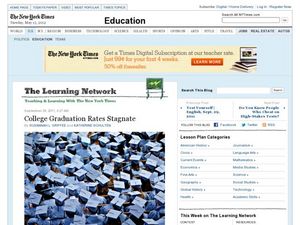Personal Genetics Education Project
Genetics, history and the American Eugenics Movement
A poignant 20-slide show introduces high schoolers to the amazing accomplishments of genomics and raises the question of eugenics. This lesson is only for mature audiences, as it deals with rape and other sensitive topics, but it is...
Random House
Go Fish!
"One fish, two fish, red fish, blue fish." Kids color, cut out, shuffle and deal a set of cards to play Go Fish!, use hams and green egg cards to play tic-tac-toe, and engage in other activities connected to books by Dr. Seuss. Oh, the...
Stanford University
Public Housing
The Fair Deal was meant to give Americans after World War II a basic standard of living. Those in public housing often found that promise fell short. Learners consider whether the effort was successful by evaluating images, testimonies,...
Curated OER
The Great Depression: A World Struggle
Students research the impact of the Great Depression on the United States. In groups, they use the internet to describe each of FDR's New Deal Programs and how it helped unemployment. They also discuss how these programs affected the...
Curated OER
The Wealth Tax of 1935 and the Victory Tax of 1942
Learners explain that during the Great Depression and World War II, the Roosevelt administration implemented new, broader, and more progressive taxes in order to cover the costs of the New Deal programs and the war.
Curated OER
Writing Exercises: Modern Economic Issues, #3
Developing nations tend to deal with economic issues differently than developed nations. Learners explore modern economic issues such as the Latin American economy, cash-crop economy, and industrial economy by responding to three...
Center for History Education
Debating Social Security: Understanding and Evaluating the Social Security Act of 1935
With throngs of Americans out of work and hungry, Franklin D. Roosevelt made the bold move to establish a social safety net with programs such as Social Security. The move was—and still is—controversial. Using documents from the 1930s,...
Curated OER
Help the Upset Person Activity
Assess what self-help techniques your students know for dealing with upset emotions with this conversational activity. The teacher begins by role playing as an upset individual, using visual images as prompts, and then asks students for...
Curated OER
What's Legal with Music on the Web?
Student research legalities of downloading music from Internet, gather information on citizens who have been charged with downloading/copyright crimes, find out who is working to create new laws dealing with this technology, explore what...
Shmoop
ELA.CCSS.ELA-Literacy.RL.9-10.9
As the saying goes: there are no new stories. Standard 9 for reading literature in the Common Core addresses this fact and requires that students be able to analyze how authors use the themes, stories, and characters of earlier works....
Curated OER
Race and Crime in the United States: Are We Victims of Discrimination or Antiheroes?
Using methods adopted by Public Policy Analysts (PPA) class groups define a social problem, gather evidence to document the existence of the problem, identify causes, evaluate existing policies designed to deal with the problem, develop...
Curated OER
Speaking Out About Kosovo
Invite your class to reflect on the responsibility of newspapers to act as vehicles for citizens to voice their opinions. Using an article to gain factual info. about gov't strategies in dealing with current events in Kosovo, students...
Curated OER
Teacher Notes
Gathering information, distinguishing between arguments, preparing an oral presentation; these skills are fostered as 10th graders explore aspects of global trade and politics. They use the Internet to gather information about NATO, The...
Curated OER
All Eyes on Iowa
Guid your learners as they become informed members of our community. They'll consider each of the seven questions as they read the New York Times article "All Eye on Iowa." This article relates topics dealing with the 2012 presidential...
Curated OER
Who is Mark Zuckerberg?: Reading Informational Text
This New York Times "Learning Network" exercise provides 10 questions that apply to an article about Mark Zuckerberg. It poses key journalistic questions like, who, what, why, where, how, and when. This resource provides a nice, short...
Curated OER
College Graduation Rate Stagnate
College has become a way to prepare for the future. However, according to this New York Times article, college graduation rates are stagnating. Kids read the article and then answer nine questions answering who, what, when, where, and...
Curated OER
Relative Positions of the Earth, Moon, and Sun Over Time
Teacher pages for four different activities and three assessments are provided in this resource. Topics deal with how the sun's position and Earth's atmosphere affect the amount of solar energy reaching Earth's surface. The concepts and...
Curated OER
Definite Article or Zero Article-Geography
Here is a grammar and geography worksheet! Learners choose the correct sentence or answer for sixteen questions dealing with articles in connection with geography.
Curated OER
Cartoons for the Classroom: Nationalizing Banks
Do your economists understand the complexities of the recent financial crisis? Use this political cartoon analysis worksheet to shed some humor and light on the nationalization of banks. The cartoonist utilizes irony to make his point....
Council for the Curriculum, Examinations and Assessment
Managing Change
Learning to embrace the opportunities and challenges change presents is the focus of the exercises and activities in this fifth session of a 10-lesson course on Social, Physical, Emotional, Cognitive and Spiritual (SPECS) health. The...
The New York Times
Investigating the Heroin and Prescription Opioid Epidemic
How bad is the opioid crisis in America? Has it gotten worse in the last few decades? Why? High schoolers delve into these questions with a thorough and thoughtful lesson from The New York Times on heroin prescription opioids. Starting...
Constitutional Rights Foundation
The War of 1812: America’s First Declared War
Free Trade and Sailor's Rights! Pupils dive into America's first declared war, the War of 1812. They analyze the presidencies of Jefferson and Madison through diary entries and historical reasoning. To conclude the lesson, they use their...
Missouri Department of Elementary
My Problem…Your Problem…Our Problem
Encourage sixth graders to take responsibility for their actions and become a problem solver. Pupils discuss new problems faced in sixth grade then identify ones that involve other people. A worksheet guides their practice in conflict...
NOAA
What's the Difference?
Due to the isolation of seamounts, their biodiversity offers a great deal of information on the development of biological and physical processes. Pupils use simple cluster analysis to rate the similarity and differences in biological...


